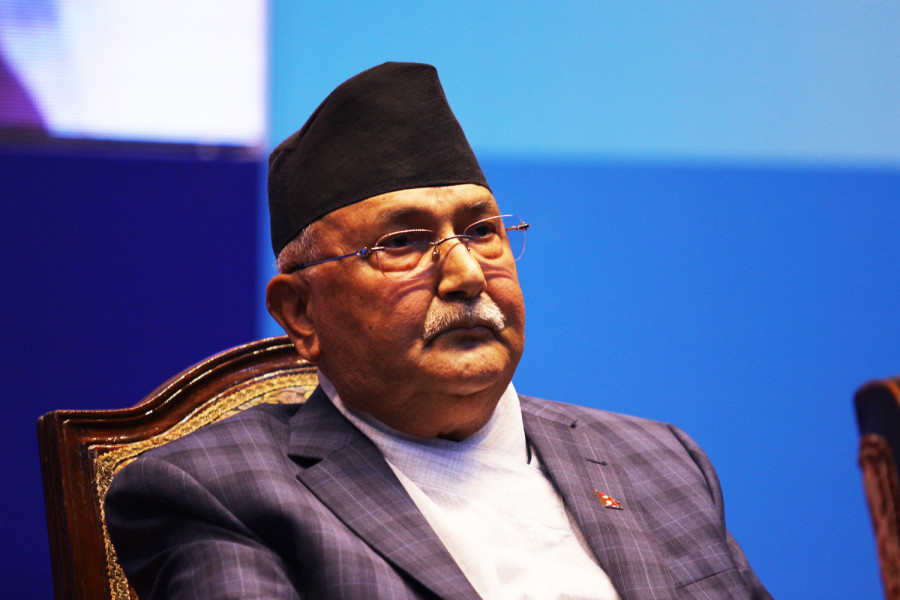Editorial
Has Oli crossed Laxman Rekha?
Ram’s birthplace and nationality can be debated endlessly. But the prime minister’s rodomontade raises serious questions.
Prime Minister KP Sharma Oli is known for his tongue-in-cheek remarks and blithe disregard for his critics. He never misses a chance to throw stinging rebukes at his detractors. Lately, faced with criticism for his failure to run the government, especially in the wake of the Covid-19 pandemic, he has been ratcheting up ultranationalist rhetoric. But on Monday, he took things to yet another level, mixing religion with his nationalist agenda. While addressing a function organised to mark the 207th birth anniversary of poet Bhanubhakta Acharya, the prime minister said Lord Ram was born in Nepal, that he was a Nepali, and that India had made cultural aggression by creating a ‘fake’ Ayodhya.
This comes on the heels of his earlier remark against India over the country’s national emblem from Parliament. In the same breath, he had also remarked that the Indian version of the coronavirus was more lethal than that from China or Italy. Making statements for the consumption of his own constituency is one thing, but using public platforms to touch upon issues that are emotive to people can have serious ramifications. It is quite understandable that Oli made the remarks as diversionary tactics after being cornered in the party in the wake of growing demands for his resignation, both as party chair and prime minister.
As the late Indian scholar AK Ramanujan put it eloquently in his essay ‘Three hundred Ramayanas’, Valmiki’s Ramayana is just one of the over 300 tellings of the epic that enrich the cultural traditions of the Indian subcontinent and South-east Asia. ‘No text is original, yet no telling is a mere retelling—and the story has no closure, although it may be enclosed in a text’, Ramanujan wrote. In that sense, every new telling of the Ramayana is equally valid as the last one, and Oli is entitled to come up with a new telling. But the way he ratcheted up the issue of Ram’s birth just to needle India is problematic. In his attempt to attack the Indian political establishment, he ended up attacking the faith of millions of Indians, and that is not acceptable. If anything, Oli’s telling of the Ramayana should be independent of his frustration against his detractors in New Delhi, as Nepal-India relations must outlive the megalomaniacs of the day.
Nepal’s transition into a secular country in 2015, shedding the tag of 'the only Hindu kingdom in the world' marked a great leap forward, as its sole aim was to ensure democratic governance in a country with striking ethnic, cultural, linguistic and religious diversity. The constitution recognising the country as a secular federal democratic republic meant the state ensuring equal rights to the country’s different communities. When the constitution was rushed in 2015, it was Oli who played an instrumental role. Since his election to power, though, it has been a slippery slope for the country. Hence, Oli’s statement should not be taken in isolation also because of the way the governments at sub-national levels are prioritising religion over development projects. For example, in the far west, a significant chunk of the budget last year was allocated for temple construction. The region is the country’s poorest province where 33.9 percent of people are under the poverty line. The local units and elected representatives, who are supposed to prioritise development projects and ensure service delivery to the people, have set their sights on temples. A Centre for Investigative Journalism-Nepal report said last year that impoverished Province 2 and Sudurpaschim spent Rs2 billion on temples and shrines alone.
People gave the electoral mandate to Oli to ensure good governance and strengthen Nepal as a secular federal republic. His constant resorting to nationalism, and now mixing it with religion, does not bode well. Nepal-India ties are already at a low, but people of both countries still enjoy good relations. Oli’s statements, however, threaten ties at the people’s level. The prime minister has already become a hot topic for the Indian media which has been brazenly broadcasting baseless reports, at times linking him with Chinese Ambassador to Nepal Hou Yanqi. The Indian media’s reports, however, have come to Oli’s advantage on home turf. If it is Oli’s calculated move to provide more fodder to the Indian media to shore up support for him back home, it is even more unfortunate.




 10.12°C Kathmandu
10.12°C Kathmandu













